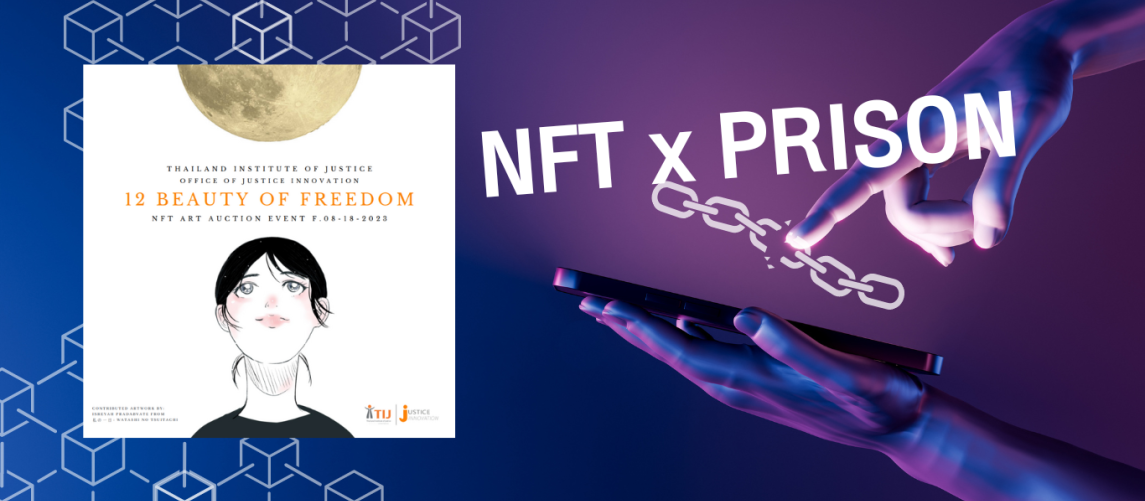The NFTxPrison Project Launching the World's First Inmates' NFT Collection Auction
.png)
"The intersection of society and blockchain technology can contribute to the betterment of society. NFTs can aid in fundraising for marginalized groups, share stories, generate income, address mental health issues, help those without identity, who feel invisible or excluded from social welfare services, reclaim human rights, and regain their sense of self. The digital world can offer protection and empowerment," said Isreyah Pradabvate, consultant of the project, NFT artist and influencer, and pioneer in the Thai NFT scene.
Starting a new life for former wrongdoers who have served time behind bars presents significant challenges. They must confront obstacles in restarting from scratch, encompassing life skills, vocational expertise, and potentially unequal financial status. They must adjust to a life outside prison that might lead them back to the same wrongdoing, as within 3 years, statistics from the Department of Corrections reveal that 30% of released offenders in Thailand reoffend.
The Thailand Institute of Justice (TIJ) recognizes the necessity of preparing individuals for reintegration into society before releasing them. Drawing on TIJ's experience in supporting both current inmates and those who've served their sentences in rebuilding lives, the focus lies in rejuvenating and developing skills pertinent to adjusting and reentering the workforce. Challenges are apparent in aligning these skills with the evolving needs of society, especially in terms of technological advancement, encompassing social media, digital assets, metaverse, and NFTs, which are beyond inmates' reach.
Yet, challenges come with opportunities. TIJ believes in the potential for development, specifically in enhancing artistic skills among inmates. As some correctional facilities already provide artistic training, the NFT art development project was initiated. NFT, or Non-Fungible Token, is a form of digital asset distinct from traditional cryptocurrencies. Unlike cryptocurrencies like Bitcoin or Ethereum, each NFT carries its own unique value.
The most prevalent form of NFT creation is through visual artwork. However, NFT accumulation isn't driven solely by the art's aesthetics or the artist's utility; the community recognizes NFTs based on the storytelling and branding tied to the creator. NFT trading occurs on various blockchain-based marketplaces, such as Opensea, Foundation, and Knownorigin.
.png)
The NFT art development project for inmates emphasizes their education in technology, NFT e-media, NFT artist profession, and principles of storytelling, crucial in conveying narratives behind NFT art. Despite limitations in teaching digital art creation tools, inmates receive training in artistic techniques and craft, leading them to learn how to transform their thoughts into creations. The artworks are then digitally copied, marking a success as 60 inmates joined the initiative, creating over 100 distinct images.
At the "Innovation for ASEAN Justice 2023: Legal Principles, Data, and the Future of the Justice System" event held on August 18, 2566 B.E., the TIJ collaborated with NFT artists to showcase a selection of 12 NFT artworks created by inmates from Thonburi Remand Prison and Chonburi Central Prison. These artworks were presented under the theme "12 Beauties of Freedom: The NFT Collection." The event served to educate attendees about NFTs and featured the screening of the short film "Behind the Wall." Additionally, an auction was conducted for the 12 artworks, collectively valued at 260,000 baht or 4.5 ETH, with the proceeds intended to support inmates participating in the project.
The first auctioned piece, "Beauty of the Moon," depicts a full moon with yellow hues over a deep blue night sky. This image narrates a moment when the artist – an inmate - gazes at the moon during a shift, after years of confinement that prevented moon sightings. This work signifies the possibilities of nurturing and transforming inmates' potential through NFT art.
TIJ envisions this initiative as a stepping stone to introducing inmates to new opportunities beyond prison walls and fostering novel perspectives among outsiders, ultimately empowering inmates to reintegrate into society amid rapid digital transformations, utilizing creative thinking and inspiration to lead fulfilling lives.



